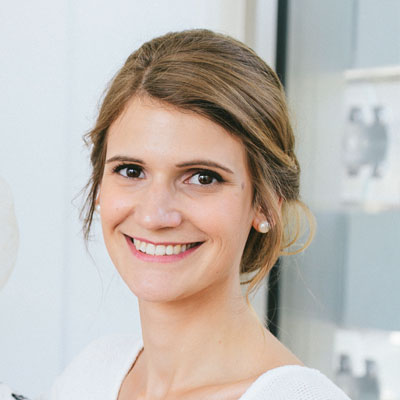Parents' Support Group
As an instrumental component of the faculty’s Scheme for Supporting New Parents (SSNP), the parents’ support group serves as a mechanism to enhance networking opportunities and facilitate learning among FBE academics and professional staff, leveraging the insights and experiences of individuals with relevant knowledge in this area.
Whether you wish to provide support or are in need of support, we welcome you to join the group!
How to join the group?
It is simple – please get in touch with us at fbembsl-di@unimelb.edu.au to express your interest in participation.
Group leads

Alexandra de Gendre
Dr. Alexandra de Gendre is a McKenzie Post-Doctoral Research Fellow in the Department of Economics. Alexandra has been co-leading the establishment of the parenting support group for SSNP participants. “The idea is to have a place for new parents to discuss expecting a child, being a new parent, and more,” says Alexandra. “People have different attitudes and comfort levels when discussing parenting, and we aim to make the support group a safe and welcoming space.”

Nicolas Salamanca Acosta
Dr Nicolas Salamanca Acosta is a Senior Research Fellow at the Melbourne Institute. Nicolas co-leads the FBE Parents’ Support Group, together with Dr. Alexandra de Gendre.
Parental resources list
For FBE staff who are prospective, expectant, and new parents.
While planning for pregnancy
Embarking on the journey of parenthood is a profound and exhilarating experience, and careful planning can pave the way for a smooth and joyful transition.
- Consider the pros and cons of private health insurance. Talk with your insurance provider and ask for suggestions.
There is a Bupa clinic operating on campus. The clinic operates on Thursdays and Fridays at Carlton Wellbeing (Building 385, located at the corner of Argyle Place North and Cardigan Street).
- How to plan for the best possible retirement (for both parents) and how to anticipate on career breaks and their impact on your Super. Talk with a UniSuper advisor for advice. You can meet with a super consultant or financial advisor on campus or via secure video conference.
Useful resources are also available at:
- Victoria Assisted Reproductive Treatment Authority (VARTA) provides independent information and support for individuals, couples, professionals on fertility, infertility, assisted reproductive technology (ART) and the best interests of children born. VARTA services include: egg freezing, IVF, counselling services and information about laws that increase availability/ access to fertility treatment.
- Example of a fertility clinic:Number 1 Fertility services include: a wide range of fertility treatment options, donor and surrogacy, counselling, genetic testing, and more.
- Rainbow Families is a charity organisation that supports, celebrates, empowers and advocates for Rainbow Families (LGBTQ+) at every stage of their lives. Rainbow families is an active, vibrant community of volunteers and partners that create the inclusive and safe services, spaces, programs and resources Rainbow Families need to thrive. Rainbow Families services include: helping future parents explore their family-making options through to antenatal classes, lactation support, playgroups, kids’ personal safety programs and social events, also advocacy and activist work that addresses systemic discrimination through policy work and research.
During pregnancy
Balancing the miraculous journey of pregnancy while sustaining outcomes in the workplace is a remarkable feat. How to achieve this harmonious equilibrium? These are some suggestions for you to consider:
- Set expectations.
- Consider that you might experience tiredness and other symptoms that might affect your productivity. Be kind to yourself during this period!
- Manage expectations on workload and productivity with supervisors/teams. Establish and maintain open communication with your supervisor and HoD of your department. Your supervisor and HoD also have the responsibility of facilitating open and transparent communication in the discussions.
- Discuss the need for flexibility to manage medical appointments. For example, hospital visits can include a lot of waiting time, often during weekdays.
- Example of private (i.e., not a public hospital) maternity and women’s health hospital: Frances Perry House, collocated with the public hospital - Royal Women’s Hospital in Parkville.
- Health and pregnancy preferences.
- Consider the pros and cons of shared care vs hospital care. Shared care with your GP means that you are followed by the same person throughout and wait times can be shorter, but your GP typically won’t be there to help with delivering your baby.
- Consider doulas and private midwives. Doulas can be especially helpful during pregnancy and in the early days post-partum (e.g., with meals); private midwives can also give you access to additional information and additional care.
- Register for childcare.
- Looking for a care arrangement for your child after you return to work can be tedious. Consider what your preferences are; if you plan on enrolling your child in childcare, you can sign up for a waitlist as early as when you first find out about your pregnancy. You don’t need to inform your supervisor or HR to sign up for UoM childcare services, and this information will not be communicated without your authorization.
- Start the process for Childcare Subsidy and other Centrelink support. Contact HR or a legal advisor for advice.
- Prepare for paperwork (birth certificate, birth declarations abroad, passport(s)).
If your child is Australian by birth and you plan on traveling overseas while on parental leave, expect to wait at least 3 months between the birth of your child and receiving their Australian passport (even including paying additional fees to express procedures).
- Plan parental leave. Contact HR for advice.
- Know your rights and entitlements.
- Ask about Keeping-in-touch days.
- Ask about your eligibility for a Return to work retention benefits.
- Ask about Concurrent Partner leave.
- Ask about your eligibility for Centrelink Paid Parental Leave.
- Apply for Centrelink payments; you can do this seamlessly through the Centrelink app. Centerlink will determine your eligibility for Family Tax Benefits and other payments.
- For academics who plan parental leave, pay attention to the following topics:
- Are you the Project Supervisor on human ethics? Human ethics projects are subject to annual approval and the reporting deadlines might occur during your leave. Discuss how to manage this with your supervisor and HoD. You can also file a ticket in ServiceNow for advice.
- Are you involved in PhD supervision? Plan with others on the supervision team as well as the student, in relation to the supervision during your leave.
- What happens with any late assignments / special exams after the leave date? Discuss these tasks with your supervisor and HoD of your department and seek their advice for a solution.
- Develop a strategy to ensure staying in touch with your work unit during the leave. Discuss your plans with your supervisor and HoD. If needed, contact HR for advice.
- Plan and apply for the Scheme for Supporting FBE Staff who are New Parents (SSNP). Initiate discussion with your supervisor on workload and potential work relief after returning from parental leave.
During Parental leave
Whether you are a new parent or welcoming another addition to your family, stepping into the world of parenthood is a whirlwind of joy, challenges, and endless discovery.
- Set expectations.
Recovery time post-partum can be long, everyone’s situation is different. Be kind to yourself!
- Finish paperwork.
- Request your child’s birth certificate.
- Enroll your child into Medicare.
- Enroll your child into childcare. Find out more about Early Childhood Education Services available for children of staff.
- Apply for your child’s passport(s)
- Maternal Health Nurse.
- Utilize keep-in-touch days and implement the strategy developed during pregnancy, to ensure staying-in-touch with your work unit during the leave.
After returning to work
Seamlessly reintegrating into the workforce while continuing to nurture your family does not happen easily. There are some suggestions for you to consider:
- Set expectations.
- First days in childcare: it often takes a few weeks until your child is fully accustomed to daycare. Expect short workdays at first to keep your child’s first days/weeks in daycare short. Discuss expectations with your daycare.
- Childcare sickness: children are often sick when exposed to other children at daycare. Expect to have interrupted weeks when this happens, and to get sick yourself.
- Productivity at work might start low. Allow time for improvements.
- Schedule regular catchups with your supervisor and HoD. Having open and transparent communication is crucial.
- Part-time work. In the case of reducing workload and converting to a factional contract after returning to work from the leave, discuss this with your supervisor and HoD. If necessary, contact HR BPs for advice.
- Time management tips:
- Avoid meetings in the morning.
- Protect your productive hours.
- If you apply to SSNP, make sure to request teaching or service relief and make sure that your supervisors are aware of your relief.
- And, join the FBE Parents’ Support Group!
Useful links
FBE scheme for Supporting New Parents
Unimelb ServiceNow:
- Visit: https://staff.unimelb.edu.au/
- Navigate to “Quick Access” at the top of the webpage.
- Select “ServiceNow”.
page updated 8 February 2024